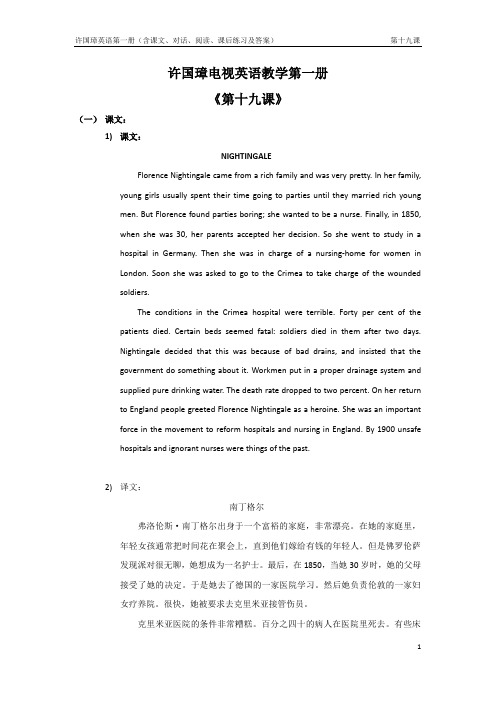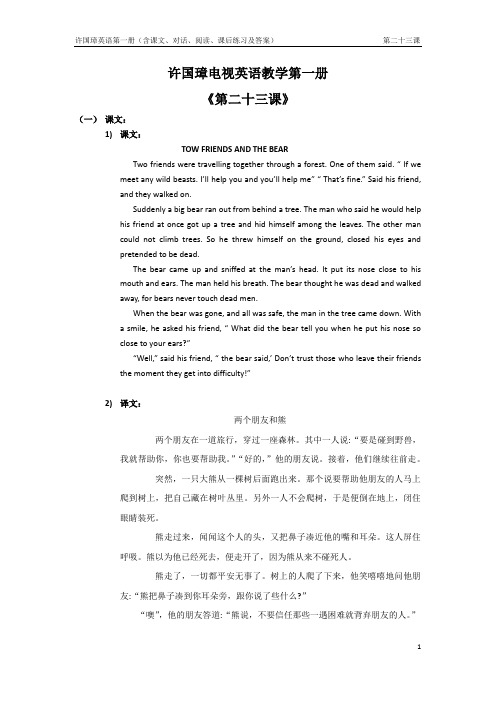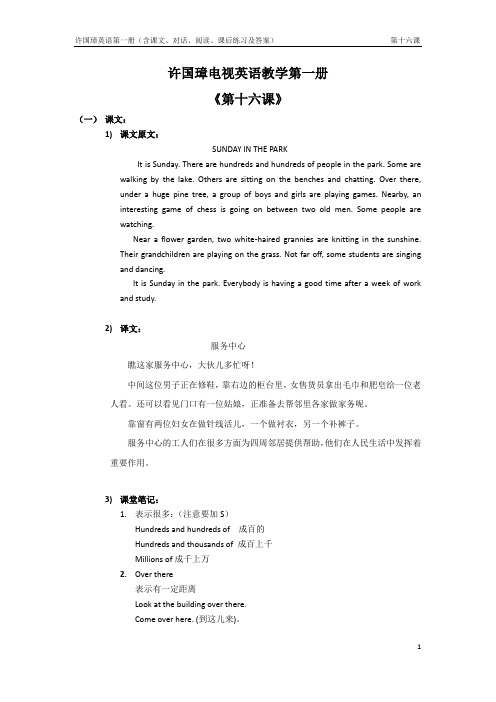许国璋英语第一册课文、语法、对话文本
许国璋英语1 Lesson8

OUR CLASS
There are six classes in Grade One. We are in Class Five. Our class is not very big. There are fifteen students in it. Among them there are seven boys and eight girls. Liu Yang is our monitor and he is from Shanghai. We work very hard. We help each othere a map on the wall? Yes, there is. Is there a clock on the wall? No, there isn't. Are there many desks and chairs in the room? Yes, there are. Are there any tables in the room? No, there aren't.
Notes (并参考P66)
There is a blackboard in our classroom. There are two doors and four windows in it. there不表示“那儿”,而是一个引导词,后面加be,表示“……地 方有……”。 例如: There is a blackboard in our classroom.我们教室里有一块黑板。 主语——blackboard; 谓语——is; 状语——in our classroom。 There are two doors and four windows in it.教室里有两扇门和四扇 窗户。 主语——two doors and four windows;谓语——are;状语——in it。 否定形式是在there is/are 后加not——there isn’t / aren’t,并常与 any连用。 例如: There isn’t any book on the desk. 桌上没有书。 There aren’t any pictures on the wall. 墙上没有画片。
许国璋英语第一册第二十二课课文、练习、答案

许国璋电视英语教学第一册《第二十二课》(一)课文:1)新课文:TOURISMModern means of transportation, communication, advertising and credit have all played a part in the growth of a giant new industry, tourism. Tourism is a serviceindustry. It does not sell a product that you can own but provides services on atemporary basis. the customer gets such things as a seat on a plane, a room in ahotel, and a chance to sit on a beach in the sunshine.Until modern times, a trip was often a long and difficult adventure. People had to travel by horse or camel or on foot. The first development in moderntransportation was the steamship. More recently, automobiles and planes havemade travel both faster and more convenient.Advertising has played a large part in the growth of tourism, when hotels and travel agencies began to advertise the attractions of different tourist areas, theairlines and other transportation companies advertised the low fares to reach them.Modern means of communication have enabled the travelers to reserve a plane seator a hotel room from a long distance. And they can travel now and pay later by usingtheir credit cards. All these means have become one of the features of modern life.2)译文:旅游业现代交通、通信、广告以及信用手段对新兴的庞大的行业——旅游业的发展起到了作用。
许国璋英语第一册第二十一课课文、对话、练习、答案

许国璋英语第⼀册第⼆⼗⼀课课⽂、对话、练习、答案许国璋电视英语教学第⼀册《第⼆⼗⼀课》(⼀)课⽂:1)课⽂原⽂:A DAY OF HARVESTING( A Page from a student’s Diary)October 24.Today we began harvesting. We got up at daybreak, and after an early breakfast, we started off for the rice fields. We got there after half an hour’s walk.The fields around us looked like a golden sea. I have never seen anything so beautiful! We worked side by side with the farmers. At first some of us were ratherslow. The farmers showed us how to cut the rice and how to tie the bundles. Soonwe learned to work faster.We worked in three groups. “ Faster, faster! We mustn’t fall behind the others!”That was the thought in everybody’s mind.Evening came before we realize it. We put down our sickles and looked at each other. Our clothes were wet with sweat. On every face there was a smile.We harvested thirty mu altogether. That was not bad for the first day. But tomorrow we shall certainly do better- much better.2)课⽂译⽂:收割的⼀⽇(学⽣⽇记⼀则)10⽉24⽇我们今天开始收割。
许国璋英语第一册第十八课课文、对话、练习、答案

许国璋电视英语教学第一册《第十八课》(一)课文:1)课文原文:THE LIBRARYOn our library door are two big signs:No SmokingNo litteringLibrary HoursMonday through Friday: 8 a.m. – 10 p. m.Saturday: 8 a.m. – 6 p. m.Sunday: 2 p. m. – 10 p. mIt is Monday. It is 8 o’clock. Many students are waiting for the library to open.This is not unusual during the examination week. Now the doors are open. Thestudents walk in quietly. The library is always quiet even on very busy days.You are here in the library. You must obey library rules. You mustn’t smoke. You mustn’t litter the floor.You can borrow books from the library, but you can’t borrow one without a library card.Sometimes you may want to borrow a book but you don’t know its call number.You may ask the librarian to help you. He will be glad to help.2)译文:图书馆图书馆门口有两张布告:禁止吸烟禁止乱扔废物图书馆开放时间星期一至星期五上午8点-晚上10点星期六上午8点-下午6点星期日下午2点-晚上10点今天星期一,现在是8点钟。
许国璋英语第一册第十九课课文、对话、练习、答案

许国璋电视英语教学第一册《第十九课》(一)课文:1)课文:NIGHTINGALEFlorence Nightingale came from a rich family and was very pretty. In her family, young girls usually spent their time going to parties until they married rich youngmen. But Florence found parties boring; she wanted to be a nurse. Finally, in 1850,when she was 30, her parents accepted her decision. So she went to study in ahospital in Germany. Then she was in charge of a nursing-home for women inLondon. Soon she was asked to go to the Crimea to take charge of the woundedsoldiers.The conditions in the Crimea hospital were terrible. Forty per cent of the patients died. Certain beds seemed fatal: soldiers died in them after two days.Nightingale decided that this was because of bad drains, and insisted that thegovernment do something about it. Workmen put in a proper drainage system andsupplied pure drinking water. The death rate dropped to two percent. On her returnto England people greeted Florence Nightingale as a heroine. She was an importantforce in the movement to reform hospitals and nursing in England. By 1900 unsafehospitals and ignorant nurses were things of the past.2)译文:南丁格尔弗洛伦斯·南丁格尔出身于一个富裕的家庭,非常漂亮。
许国璋英语第一册第二十四课课文、对话、练习题、答案

许国璋电视英语教学第一册《第二十四课》(一)课文:1)课文:INSPECTOR HORNBERG VISITS A SCHOOLThe classroom was very quiet. Outside, the leafless trees were white with the first snowfall. But not one pair of eyes stayed from the history books whichtwenty-five little girls were studying so earnestly.This was the year 1877, and the school was in Warsaw, Poland. A large part of Poland had been conquered by Russia. The Russia Tsar would not allow Polishchildren to study the history of their own country or even their own language. Buthere the teacher and her pupils were doing just that, although the Russians hadspies everywhere in Warsaw.Among the children was Manya Sklodovska. She was a very bright pupil. She was deep in the book she was reading. Suddenly there came the faint sound of a bell.Manya listened fearfully. Was it the signal? Yes! Two long rings, two short rings.Every head came up. Quick hands grabbed all the Polish history books off the desks, and hid them away. The girls swiftly took sewing materials from their desks.They began to embroider little squares of cloth.The outer door opened. There stood Inspector Hornberg.Hornberg had been put in charge by the Russians of the private schools of Warsaw. He was a heavy man in a tight-fitting yellow and blue uniform. With himwas Mademoiselle Sikorska, the head of the school.“ We have tow sewing classes a week, Mr. Inspector.” explained Mademoiselle Tupalska, the teacher “ I read to the children while they work.”“And what have you been reading to your pupils, Mademoiselle?”inspector Hornberg demanded.She held up her book “ Russian fairy tales.” She said.The inspector gave a grunt of approval. “Now,”he said, “I should like to question one of your pupils.”“Manya Sklodovska, please stand up.” The teacher said quietly.Manya rose from her seat without a word, trying not to tremble.“Recite the Lord’s Prayer in Russian.” Inspector Hornberg ordered.Manya recited the prayer in a low voice, careful not to show her feelings.“Now name the members of the Imperial Russian Family.”Manya gave the names.“now tell me.” Hornberg demanded, “ who is our ruler?”Manya’s face went pale. She opened her mouth, but the words would not come.“So, my little Polish patriot, you do not wish to tell me who rules over us.” the Russian inspector said. “answer me!”“His Majesty AlexanderⅡ, Tsar of All the Russia,” she said. But her voice was trembling.“That’s more like it,”Hornberg rose from his chair. “Now Mademoiselle Sikorska, I wish to visit one of the other classes.”“Certainly, Mr. Inspector, “ Mademoiselle Sikorska answered.When the door had closed upon them, the schoolgirls began to stir. Without a word, the teacher put her arms around Manya and kissed her. Manya was in tears.2)译文:霍恩伯格督学查看学校教室里鸦雀无声。
许国璋电视英语教学第一册第二十三课课文、练习、答案

许国璋电视英语教学第一册《第二十三课》(一)课文:1)课文:TOW FRIENDS AND THE BEARTwo friends were travelling together through a forest. One of them said. “ If we meet any wild beasts. I’ll help you and you’ll help me”“ That’s fine.” Said his friend,and they walked on.Suddenly a big bear ran out from behind a tree. The man who said he would help his friend at once got up a tree and hid himself among the leaves. The other mancould not climb trees. So he threw himself on the ground, closed his eyes andpretended to be dead.The bear came up and sniffed at the man’s head. It put its nose close to his mouth and ears. The man held his breath. The bear thought he was dead and walkedaway, for bears never touch dead men.When the bear was gone, and all was safe, the man in the tree came down. Witha smile, he asked his friend, “ What did the bear tell you when he put his nose soclose to your ears?”“Well,” said his friend, “ the bear said,’Don’t trust those who leave their friends the moment they get into difficulty!”2)译文:两个朋友和熊两个朋友在一道旅行,穿过一座森林。
许国璋英语第一册第十六课课文、对话、练习、答案(2)

许国璋电视英语教学第一册《第十六课》(一)课文:1)课文原文:SUNDAY IN THE PARKIt is Sunday. There are hundreds and hundreds of people in the park. Some are walking by the lake. Others are sitting on the benches and chatting. Over there,under a huge pine tree, a group of boys and girls are playing games. Nearby, aninteresting game of chess is going on between two old men. Some people arewatching.Near a flower garden, two white-haired grannies are knitting in the sunshine.Their grandchildren are playing on the grass. Not far off, some students are singingand dancing.It is Sunday in the park. Everybody is having a good time after a week of work and study.2)译文:服务中心瞧这家服务中心,大伙儿多忙呀!中间这位男子正在修鞋,靠右边的柜台里,女售货员拿出毛巾和肥皂给一位老人看。
还可以看见门口有一位姑娘,正准备去帮邻里各家做家务呢。
靠窗有两位妇女在做针线活儿,一个做衬衣,另一个补裤子。
服务中心的工人们在很多方面为四周邻居提供帮助,他们在人民生活中发挥着重要作用。
3)课堂笔记:1.表示很多:(注意要加S)Hundreds and hundreds of 成百的Hundreds and thousands of 成百上千Millions of成千上万2.Over there表示有一定距离Look at the building over there.Come over here. (到这儿来)。
- 1、下载文档前请自行甄别文档内容的完整性,平台不提供额外的编辑、内容补充、找答案等附加服务。
- 2、"仅部分预览"的文档,不可在线预览部分如存在完整性等问题,可反馈申请退款(可完整预览的文档不适用该条件!)。
- 3、如文档侵犯您的权益,请联系客服反馈,我们会尽快为您处理(人工客服工作时间:9:00-18:30)。
许国璋英语第一册课文、语法、对话文本第二课a pen pensa map mapsa pet petsa spade spadesa letter letters一支钢笔钢笔(复数)一张地图地图(复数)一只宠物宠物(复数)一把锹锹(复数)一封信信(复数)第三课This is a pen.Is this a pen?That is a pencil.Is that a pencil?This is a desk.Is this a desk?That is a table.Is that a table?This is a disc.Is this a disc?That is a tape.Is that a tape?这是一支钢笔。
这是一只钢笔吗?那是一支铅笔。
那是一只铅笔吗?这是一张课桌。
这是一张课桌吗?那是一张桌子。
那是一张桌子吗?这是一张唱片。
这是一张唱片吗?那是一盘磁带。
那是一盘磁带吗?第四课Is this a pen?It is a green pen.It that a pencil? Yes, it is.It is a red pencil.Is this a desk?No, it isn't.It is a table.Is that a pick?No, it isn't.It is a spade.These are desks.Are these tables? No, they aren't.They are desks. Those are knives.Are those pencils? No, they aren't.They are knives.这是一支钢笔吗?是的。
这是一支绿色的钢笔。
那是一支铅笔吗?是的。
那是一支红色的铅笔。
这是一张课桌吗?不,不是。
它是一张桌子。
那是一把镐吗?不,不是。
它是一把锹。
这些是课桌。
这些是桌子吗?不,不是。
它们是课桌。
那些是刀子。
那些是铅笔吗?不,不是。
它们是刀子。
一、课文What is this?It is a book.What are these?They are books.What is that?It is a notebook.What are those?They are notebooks.I am a student.We are students.You are a teacher.You are teachers.He is a farmer.They are farmers.She is a doctor.They are doctors.Is he a farmer?Yes, he is.Is she a nurse?No, she isn't. She is a doctor.Are you students?Yes, we are.Are they students?No, they aren't. They are teachers.这是什么?它是一本书。
这些是什么?它们是书。
那是什么?它是一个笔记本。
那些是什么?它们是笔记本。
我是一名学生。
我们是学生。
你是一名教师。
你们是教师。
他是农民。
他们是农民。
她是医生。
她们是医生。
他是农民吗?是的,他是。
她是护士吗?不,她不是。
她是医生。
你们是学生吗?是的,我们是。
他们是学生吗?不,他们不是。
他们是教师。
二、语法人称代词单数复数第一人称I (我) we (我们) 第二人称you(你) you (你们) 第三人称he (他)they (他们) 第三人称she(她) they (她们) 第三人称it (它)they (它们)动词be的人称变化I am we areyou are you arehe is they areshe is they areit is they are第六课一、课文Good morning!Good afternoon!Good evening!Good night!Good-bye!Open your books.Let's open our books.Close your books.Let's close our books.Read the text.Let's read the text.Write down the sentence.Let's write down the sentence.AN ENGLISH LESSONMr Smith: Good morning, everybody.Students: Good morning, Mr Smith.Mr Smith: Please open your books. Let's read the text.(The students read the text.)Mr Smith: Now, let's have dictation.早上好!下午好!晚上好!晚安!再见!翻开书。
让我们翻开书。
合上书。
让我们合上书。
朗读课文。
让我们朗读课文。
抄写句子。
让我们抄写句子。
一堂英语课史密斯: 大家早上好。
学生: 早上好,史密斯。
史密斯: 翻开书,我们来朗读课文。
(学生朗读课文。
)史密斯: 现在我们进行听写。
二、语法人称代词的主格和宾格英语人称代词有两种形式:主格和宾格。
作主语时用主格,作宾语时用宾格。
单数复数主格宾格主格宾格第一人称I me we us第二人称you you you you第三人称he him they them第三人称she her they them第三人称it it they them祈使句祈使句表示命令或请求,例如:Sit down! (坐下!)Open your books,please. (请把你们的书打开。
)祈使句的句末通常用句号,为了加强语气也可以用惊叹号。
在表示客气的请求时,常加上please (请);加在前面时带重音,加在后面不带重音,书写时前面加一个逗点,例如:Please read the text.(请读课文。
)Close your books,please.(请把你们的书合上。
)祈使句的否定式是在前面加do not 或don’t (不要,别)构成的,例如: Don’t open your books.(别把你们的书打开。
)还有一种祈使句是以let us 或let’s (让我们)开头的,它表示建议别人和自己一道来做某事,例如:Let’s have dictation.(咱们来做听写吧。
)Let’s read the text.(咱们来读课文吧。
)第七课一、课文— Have you any brothers?— Yes, I have two brothers.— Have you any sisters?— No, I haven't.— Has Jane any brothers and sisters?— She has three sisters, but she has no brother.— Have the Jacksons any children?— Yes, they have two sons and a daughter.MY HOMEMy home is in Shanghai. My father is a teacher. My mother works in a nursery. My father teaches physics. My mother also teaches. She teaches children to sing and speak clearly.I have a brother and a sister. I am eighteen, my brother is eleven, and my sister is seven. My brother and my sister go to school. I am in my first year at college. I like my subject and I work very hard.—你有兄弟吗?—我有两个兄弟。
—你有姐妹吗?—我没有。
—简有兄弟姐妹吗?—她有三个姐妹,没有兄弟。
—杰克逊夫妇有子女吗?—有的,他们有两儿一女。
我的家我家在上海。
我父亲是一位教师,我母亲在一家托儿所工作。
父亲教物理;母亲也教课,教孩子们唱歌、说话要口齿清楚。
我有一个弟弟、一个妹妹。
我18岁,弟弟11岁,妹妹7岁。
弟弟妹妹都上学,我念大学一年级。
我喜欢我的专业,学得很用功。
二、语法词类英语的词按照意义、词形变化和句法作用等方面的特点可以分为十类:1. 名词(noun - n.- 缩写,下同):名词是人、事物以及抽象概念等的名称,例如:girl,desk,English等。
2. 冠词(article):冠词是附属于名词的一种虚词,它帮助说明名词的意义。
英语共有两个冠词:不定冠词a(an)和定冠词the。
3. 代词(pronoun - pron.):代词是用以代替名词的词类,例如:I,they,this等。
4. 形容词(adjective - adj.):形容词是表示人或事物的形状、性质、状态等的词。
例如:good,little 等。
5. 数词(numeral - num.):数词是表示数量和次序的词。
例如:two,first(第壹)等。
6. 动词(verb - v.):动词是表示人和事物的行为或状态的词,例如:open,sleep等。
7. 副词(adverb - adv.):副词是在句中修饰动词、形容词或其他副词,以说明状态、性质和程度等的词,例如:down,very等。
8. 介词(preposition - prep.):介词是表示名词或代词与其他词的关系的虚词,例如:in,on,at等。
9. 连词(conjunction - conj.):连词是连接词与词、词组与词组、句子与句子的虚词,例如:but,and等。
10.感叹词(interjection - interj.):感叹词是表示说话时惊奇、喜悦等感情的词,例如: Oh(啊)等。
英语中的词,所属词类不同,形态变化有时也会随之不同,学习单词时必须注意它的词类和词形变化。
另外,一个词在英语中属于某词类,译成汉语却不一定用同一词类,必须注意避免按字直译。
句子成分一个句子由若干成分组成,这些成分叫做句子成分。
句子成分依照在句中的作用分为:主语、谓语、宾语、定语、状语等。
一般句子都必须有主语和谓语;主语表示所说的是谁或是什么,谓语对主语加以说明,表示它所做的动作或所处的状态。
